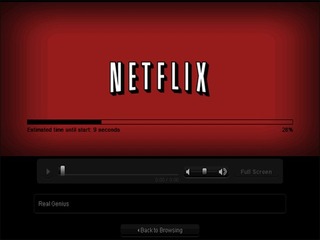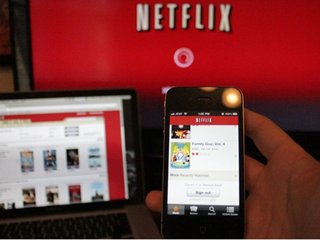Digital health funding declines for the third year in a row
AI-enabled digital health startups raised $3.7B, 37% of total funding for the sector
Read more...
Fresh on the heels of acquiring exclusive pay TV rights to Disney titles, Netflix has announced that it will be quadrupling the salary of its CEO, Reed Hastings.
Hastings will see his salary go up to $2 million in 2013, with another $2 million in compensation through stock options, according to a document filed with the Securities and Exchange Commission Friday.
This is obviously excellent news for Hastings, beyond the fact that he will be significantly richer next year. It is also a sign that the company has renewed faith in him, after a rough 2011 caused the company to slash his stock options.
Hastings' salary was $500,000 in 2012, the same as it was in 2011, but his stock options were cut in half from $3 million to $1.5 million following a series of moves that alienated customers and caused a significant drop in stock price.
A rough 2011
First, on July 12 of last year, Netflix announced its plans to hike up its monthly rates by 60%. While the stock actually hit an all time high of $304.79 the next day, the way the price hike was announced caused significant backlash from users, causing the stock to fall over the next few months, finally going below $200 a share on September 15. The move caused Netflix to lower its subscriber estimate by 1 million users.
But what happened next was what really caused the unbridled rage against Netflix to come to a head.
In a move seemed design to anger just about everyone, including users and investors, Hasting announced on September 18 that the company would be split in two, one service for streaming and another exclusively for DVDs called Qwikster.
By the time Hastings made the announcement on October 10 that he was killing the idea, only three weeks later, the damage had been done. The stock had fallen from $155.19 before the decision to $111.62. The stock continued to fall the rest of the year, going below $100 a share on October 25. The stock ended the year at $69.29 a share after beginning at $178.41, a nearly 62% drop.
A better 2012
2012 was a bit of a better year for the company, but things were still rough. It debuted its first series, Lilyhammer, and got the rights to air new episodes of Arrested Development, but in it's third quarter earnings report in October, Netflix came in below expectations, with fewer streaming subscribers than analysts had been projecting, causing the stock to drop 16%.
At the beginning of this month, though, Netflix got the good news that it had been waiting for since the middle of last year: it announced that it had acquired exclusive pay TV rights to Disney titles starting in 2016.
Last year, Disney titles were unceremoniously yanked from Netflix’s selection of streaming content when Starz decided to pull its titles following the expiration of its contract with Netflix in February 2012.
Starz’s contract with Disney ends in 2016, at which point Netflix will become the exclusive rights’ owner, which will allow it to stream new theatrical releases from Disney in the first Pay-TV window, meaning the time at which premium TV networks like HBO and Showtime would ordinarily be allowed to show titles—usually 7-9 months after the theatrical release.
But for now, Disney has granted non-exclusive rights to Netflix for such classics as “Dumbo,” Pocahontas,” and “Alice in Wonderland,” among others. And beginning in 2013, Netflix will be able to stream Disney’s direct-to-video new releases.
As a result of this news Netflix shares jumped 14%, or $10.65, to $86.65.
On Friday, the stock was down 1.29% to $89.33 a share. The stock has fallen more than 70% since that high of $304.79 back in July 2011, but it has risen roughly 23% since the beginning of this year. That news, combined with the Disney deal, seem to have given Hastings a new life within the company.
(Image source: https://twisteddata.wordpress.com)
AI-enabled digital health startups raised $3.7B, 37% of total funding for the sector
Read more...OXcan combines proteomics and artificial intelligence for early detection
Read more...Nearly $265B in claims are denied every year because of the way they're coded
Read more...







